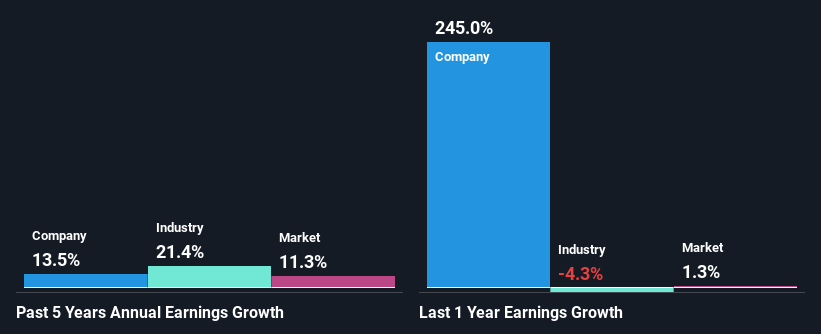Continental’s (ETR:CON) stock is up by a considerable 11% over the past week. We wonder if and what role the company’s financials play in that price change as a company’s long-term fundamentals usually dictate market outcomes. In this article, we decided to focus on Continental’s ROE.
Return on equity or ROE is an important factor to be considered by a shareholder because it tells them how effectively their capital is being reinvested. Put another way, it reveals the company’s success at turning shareholder investments into profits.
View our latest analysis for Continental
How Is ROE Calculated?
The formula for return on equity is:
Return on Equity = Net Profit (from continuing operations) ÷ Shareholders’ Equity
So, based on the above formula, the ROE for Continental is:
5.2% = €751m ÷ €14b (Based on the trailing twelve months to March 2024).
The ‘return’ is the profit over the last twelve months. So, this means that for every €1 of its shareholder’s investments, the company generates a profit of €0.05.
What Has ROE Got To Do With Earnings Growth?
So far, we’ve learned that ROE is a measure of a company’s profitability. Depending on how much of these profits the company reinvests or “retains”, and how effectively it does so, we are then able to assess a company’s earnings growth potential. Generally speaking, other things being equal, firms with a high return on equity and profit retention, have a higher growth rate than firms that don’t share these attributes.
Continental’s Earnings Growth And 5.2% ROE
At first glance, Continental’s ROE doesn’t look very promising. Next, when compared to the average industry ROE of 10%, the company’s ROE leaves us feeling even less enthusiastic. However, the moderate 13% net income growth seen by Continental over the past five years is definitely a positive. So, the growth in the company’s earnings could probably have been caused by other variables. For example, it is possible that the company’s management has made some good strategic decisions, or that the company has a low payout ratio.
We then compared Continental’s net income growth with the industry and found that the company’s growth figure is lower than the average industry growth rate of 21% in the same 5-year period, which is a bit concerning.
Earnings growth is a huge factor in stock valuation. What investors need to determine next is if the expected earnings growth, or the lack of it, is already built into the share price. Doing so will help them establish if the stock’s future looks promising or ominous. Is Continental fairly valued compared to other companies? These 3 valuation measures might help you decide.
Is Continental Using Its Retained Earnings Effectively?
Continental has a healthy combination of a moderate three-year median payout ratio of 44% (or a retention ratio of 56%) and a respectable amount of growth in earnings as we saw above, meaning that the company has been making efficient use of its profits.
Additionally, Continental has paid dividends over a period of at least ten years which means that the company is pretty serious about sharing its profits with shareholders. Existing analyst estimates suggest that the company’s future payout ratio is expected to drop to 31% over the next three years. The fact that the company’s ROE is expected to rise to 15% over the same period is explained by the drop in the payout ratio.
Conclusion
In total, it does look like Continental has some positive aspects to its business. Namely, its respectable earnings growth, which it achieved due to it retaining most of its profits. However, given the low ROE, investors may not be benefitting from all that reinvestment after all. That being so, the latest analyst forecasts show that the company will continue to see an expansion in its earnings. To know more about the latest analysts predictions for the company, check out this visualization of analyst forecasts for the company.
Have feedback on this article? Concerned about the content? Get in touch with us directly. Alternatively, email editorial-team (at) simplywallst.com.
This article by Simply Wall St is general in nature. We provide commentary based on historical data and analyst forecasts only using an unbiased methodology and our articles are not intended to be financial advice. It does not constitute a recommendation to buy or sell any stock, and does not take account of your objectives, or your financial situation. We aim to bring you long-term focused analysis driven by fundamental data. Note that our analysis may not factor in the latest price-sensitive company announcements or qualitative material. Simply Wall St has no position in any stocks mentioned.
Have feedback on this article? Concerned about the content? Get in touch with us directly. Alternatively, email editorial-team@simplywallst.com
